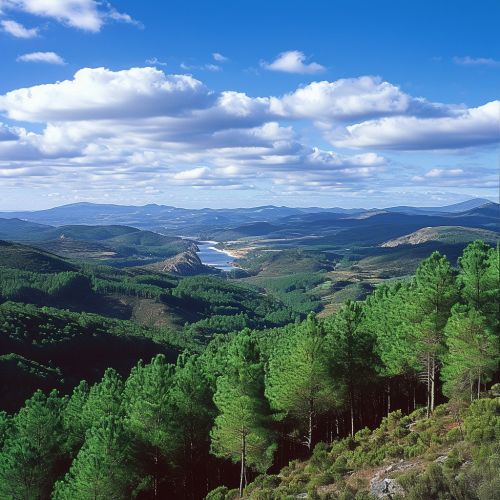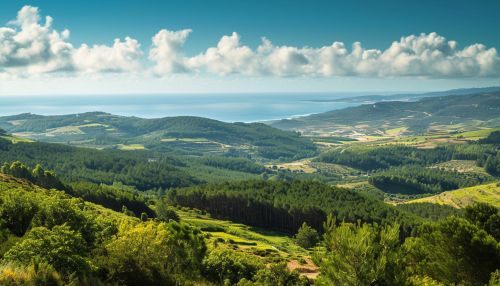Portugal
Geography
Portugal, officially known as the Portuguese Republic, is located in Southwestern Europe, on the Iberian Peninsula. It is the westernmost country of mainland Europe, being bordered to the west and south by the Atlantic Ocean and to the north and east by Spain. The territory also includes the Atlantic archipelagos of the Azores and Madeira, both autonomous regions with their own regional governments.


The country's mainland is split by its main river, the Tagus. The northern landscape is mountainous towards the interior with several plateaus indented by river valleys. The south, between the Tagus and the Algarve, features mostly rolling plains and a climate somewhat warmer and drier than in the cooler and rainier north.
History
Portugal's history dates back to the Early Middle Ages. In the 15th and 16th centuries, Portuguese explorers pioneered maritime exploration, notably under royal patronage of Prince Henry the Navigator and King John II, with such notable discoveries as Vasco da Gama's sea route to India (1497–98).
The Portuguese Empire expanded with military campaigns in Asia. However, Portugal's colonial history has been complex with its longest-held overseas territory, Macau, not relinquishing sovereignty until 1999, resulting in the longest-lived colonial empire.
Portugal was the last Western European nation to give up its colonies and overseas territories, turning over the administration of Macau to China as recently as 1999. Its colonial history has been key in influencing many aspects of its culture, particularly the Portuguese language, which is spoken across the globe.
Politics
Portugal is a parliamentary constitutional republic, with the President of the Republic serving as the head of state and the Prime Minister serving as the head of government. The country has a multi-party system. The Parliament of Portugal, known as the Assembly of the Republic, is a unicameral body composed of 230 deputies.
Portugal has been a member of the United Nations since 1955, and in 1986 it joined the European Union. It was one of the founding members of NATO, the Eurozone and the Community of Portuguese Language Countries.
Economy
Portugal's economy is diversified and increasingly service-based, with the service sector accounting for 75.7% of the country's GDP. It is a member of the European Union (EU), the Eurozone, and the Organisation for Economic Co-operation and Development (OECD), and has a high Human Development Index.
The country has seen significant growth in sectors like telecommunications, industry, tourism, and construction in recent years. Portugal's largest trading partners are Spain, Germany, France, and Italy. The country also has a high quality infrastructure.
Culture
Portugal has a rich cultural heritage that is influenced by various civilizations that have crossed the Mediterranean and the European continent. Its unique culture is the result of a mixture of many influences including Romans, Moors, Christians, and many others.
Portuguese literature, particularly the genre of poetry, is distinguished by a wealth and variety of lyric poetry, which has characterized it from the beginning of its language, after the Roman occupation.
Portugal is known for its traditional music, Fado, a melancholic genre of music characterized by mournful tunes and lyrics. The country is also renowned for its love of football, with the sport playing a central role in Portuguese culture.
